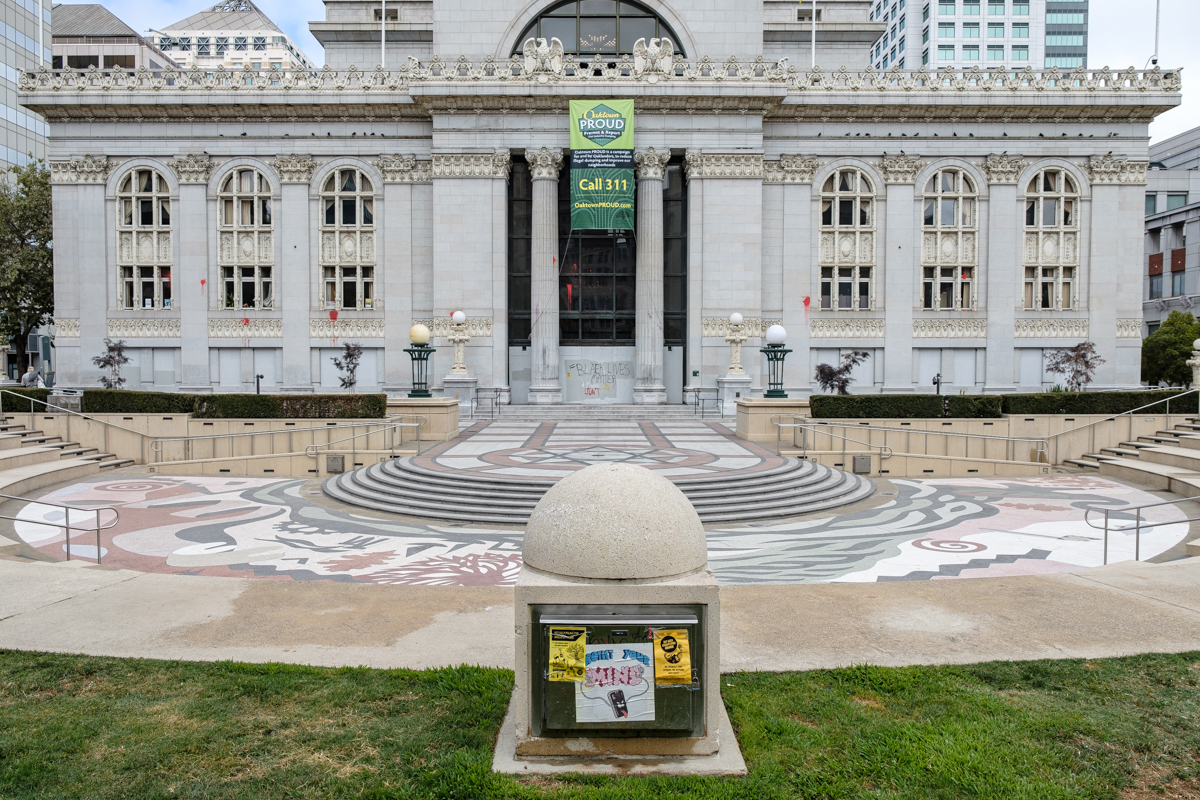Oakland is facing one of its worst budget deficits in history. At a meeting of the City Council’s Finance and Management Committee today, staff laid out new details about the slowing economy and overspending that has resulted in an estimated $62 million budget shortfall.
That estimate is the result of a $30.42 million deficit from the 2019-2020 fiscal year budget that ended on June 30, combined with a projected shortfall for the new fiscal year that began on July 1.
Interim Finance Director Margaret O’Brien said city revenues lost during the pandemic stem from multimillion-dollar dips in business taxes, hotel taxes, parking taxes, and citations. Oakland’s unemployment rate is currently 10%, and according to O’Brien, the city’s economy shrank by nearly 33% in the summer of 2020, a drop three times greater than the recession in the spring of 1958, which was previously the worst.
Oakland’s economy shrank by the same amount during the second quarter of this year (April-June 2020), a decline that was “nearly four times worse than the worst quarter during the Great Recession,” said O’Brien.

City Administrator Ed Reiskin told councilmembers that they need to start thinking about making cuts, possibly including wage reductions for city employees, deferring planned wage increases, or renegotiating how much the city contributes to worker benefits like health care insurance.
Union leaders representing city employees, who called in to the meeting, spoke out against potential layoffs, furloughs, and cuts, while citing other options to balance the budget including using reserves, tapping into emergency state and federal funds, and freezing vacant jobs.
“While I’m heartened to hear the city administration wants to work with labor, I’m disappointed to hear about the way in which they want to go about it, including cuts to many of the workers that I represent,” said Elizabeth Ortega-Toro, the executive secretary-treasurer of the Alameda Labor Council, at the meeting. Ortega-Toro noted that the biggest cause of Oakland’s budget gap is unauthorized overtime by the police department, not drops in revenue or fiscal mismanagement within other city departments. She and other public speakers called for more police accountability, and for the city administration to reign in OPD’s budget.

Overspending by OPD accounts for most of the 2019-2020 budget gap that has to be closed, as The Oaklandside reported last Friday. That overspending includes $19 million in unbudgeted overtime.
The city released a memo today further detailing what purposes OPD used overtime for. Among other things, OPD used $2.47 million in overtime to respond to protests, and another $1.54 million for enforcement of “sideshows,” or illegal car shows. Some of OPD’s overtime spending can be reimbursed—like $2.46 million spent on policing at sporting events, which could be paid back by professional sports team owners—but much of it will be paid for with city tax dollars that are in short supply because of the pandemic.
Reiskin suggested the city could also balance its budget by cutting services.
“We could brown-out of a fire engine company, which is something that is provided for in the MOU with Local 55 if certain conditions are met,” said Reiskin, referring to the option of temporarily closing a fire station through negotiations with the firefighters union.
The Oakland Fire Department ended the 2019-2020 fiscal year with savings of $1.9 million, according to the city administration’s report.
The city may be in line for additional state and federal coronavirus relief funds, and some expenses for the COVID-19 crisis could also be reimbursed by the Federal Emergency Management Agency. But Reiskin cautioned the council that these funds may not be authorized by Congress or the Trump administration.
Dan Lindheim, who served as city administrator during the Great Recession under Mayor Ron Dellums and now teaches at UC Berkeley’s Goldman School of Public Policy, said city staff appear to have overestimated some revenues and grossly underestimated police overtime spending when the City Council was making final adjustments to the 2019-2020 fiscal year budget last June, leading to the $30 million shortfall for last year’s budget.
“Bottom line,” said Lindheim about the council, “they are now $60 million plus in the hole because while the finance director was verbally clear that the city was facing a crisis worse than the Great Recession, they didn’t take the corresponding action.”

